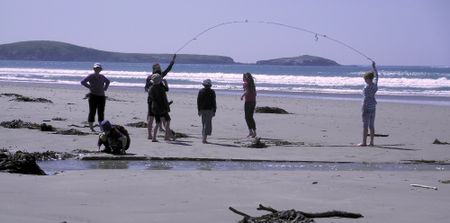ERO/Class Programme
From WikiEducator
< ERO
Contents
Democratic Classroom
- Establishing a democratic classroom is not a fast or easy option and is best achieved gradually
- Supporting all students to become natural learners and be part of the decision making process requires significant organisation
Creativity
- View with class Big bang animation
- Discuss creativity and the ability to "think outside the box"
- Talk about future plans what career paths students want to pursue
- Link these to curriculum area - vet (science, maths) pyrotechnic (science) etc
- Share how we all choose different paths and that's what school should be accommodating of
- Ask students to think about what their best school/class/learning may look like
- Students to share their ideas via - writing, drawing, poetry, oral presentation
- Link these to curriculum area - vet (science, maths) pyrotechnic (science) etc
Mandatory
- With the class establish what are the mandatory parts of the school curriculum (if any)
- Probably things such as maths, reading, writing (and probably some tests too), homework, sports and cultural events
- Plan with the class how these will be conducted and incorporated
Teacher interest
- List teacher/school ideas/themes that students can be assisted/incorporated
- the sea, stream study, planting, gardening, radio station, teaching younger students, making hoola hoops etc
Student interest
- Brainstorm general topics for studying e.g
- Rainforest animals, human body, wood work, birds, dessert, factories, swimming, orcas, Romans, sea plants, diseases, metal work, clay, fireworks, grasslands, film and photography, food, languages, penguins, surviving, science fair, time, computers...
Classroom brainstorm planning
- 3 Circles
- Mandatory - share what, when, why?
- Teacher - themes, availably of items, strengths, weaknesses
- Student - interest/s
Mixing it all up
- Creating plans with students that include the detail from the 3 circles
- Each student choosing 2-6 ideas/themes per term
- Selecting ideas from the class brainstorm
- or random out of thin air thoughts
- Selecting ideas from the class brainstorm
- Keep talking/sharing each others ideas
Student plan
- Use class brainstorm to create individual plans based on interest and class foci?
- Books, large sheets of paper, drawn, written. recorded
- Formulate questions with students
- High level requiring more than one word answers
- Seek out (and create) answers - using resources
- Books, internet, visits/visitors, phone calls, library
- Think through possibilities
- Evaluate how successful they and their teachers were
- Against established criteria, key competencies, exemplars
Student's participation in the process is consistent with learning being a matter of constructing ideas
- Introduce inquiry learning models
Key Competencies Skills
Using language symbols and texts
Listening, Sharing ideas/findings, Note taking, Writing - proofreading, Explaining, Reporting, Writing - genre/purpose, Diagrams, Questioning, Summarising, Organising, Speaking, Comprehension, Reading for a purpose, Viewing, Presenting, Recognising patterns Locating information, Selecting information, Using information, Persuading, Sequencing, Making visuals, Numeracy, Measuring
Relating to others
Cooperating, Listening, Negotiating, Considering others, Responding, Share views, Valuing others, Collaborating, Using appropriate behaviours, Awareness of audience, Giving constructive feedback, Being responsible
Managing self
Working independently/interdependently, Organising, Managing time, Setting goals, Self assessment, Reflecting, Imagining, Meeting goals and deadlines, Thinking divergently, Taking risks, Making mistakes, Being Resourceful, Showing leadership
Participating and Contributing
Working together, Connecting, Taking action, Collaborating, Sharing the load, Giving ideas, Helping others
Thinking
Making comparisons, Inferring, Designing, Predicting, Evaluating, Synthesising, Observing, Estimating,,Categorising/classifying, Brainstorming, Making choices, Making decisions, Planning, Imagining, Elaborating, Considering options, Interpreting, Justifying, Causes and consequences, Testing, Analysing, Reviewing, Generalising, Considering pros and cons, Recognising bias
Assessment
Digital:
Student owned digital content is stored on the server available by USB for portfolio viewing.
- The Server/USB-Portfolio is not really designed to be an environment which handles formally assessed content, it is more intended to be an environment in which the student collects artefacts which are evidence of a personal learning journey for reflection upon by themselves and given over to view for feedback by others
- The teacher typically assists the student in identifying tools for this purpose
- The SMS - School Management System stores data required for National Standards reporting
- These are in reading, writing and maths
- SMS are designed to handle and verify assessment information
- These are in reading, writing and maths
Paper
Student owned paper content is stored in desks, filing cabinets and on walls
- The Paper Portfolio is not really designed to be an environment which handles formally assessed content, it is more intended to be an environment in which the student collects artefacts which are evidence of a personal learning journey for reflection upon by themselves and given over to view for feedback by others.
- The teacher typically assists the student in identifying tools for this purpose
- The SMS stores results from standardised paper assessment tasks required for National Standards
Parent Evening
- Teachers to run an information evening for families and other interested people
Special Students
| Work in progress, expect frequent changes. Help and feedback is welcome. See discussion page. |
